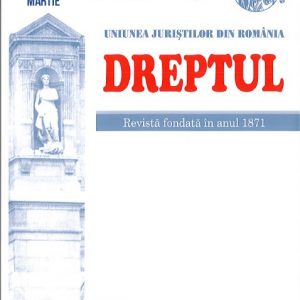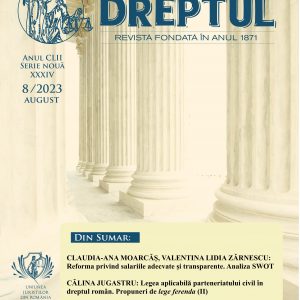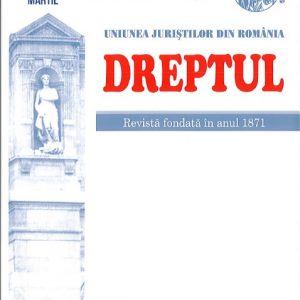-
 Paragraph (1) of Article 2506 of the Civil Code provides that “limitation does not operate automatically”. The author considers this wording not only useless but also contrary to the reality. He supports his view by emphasizing that the doctrinal thesis underlying its preparation is inaccurate and also that paragraph (1) of Article 2506 of the Civil Code contravenes certain preceding or subsequent legal provisions. In conclusion, the author believes that limitation effect occurs automatically and removing civil liability, which is a consequence of this effect, operates only at the request of those entitled to invoke limitation.
Paragraph (1) of Article 2506 of the Civil Code provides that “limitation does not operate automatically”. The author considers this wording not only useless but also contrary to the reality. He supports his view by emphasizing that the doctrinal thesis underlying its preparation is inaccurate and also that paragraph (1) of Article 2506 of the Civil Code contravenes certain preceding or subsequent legal provisions. In conclusion, the author believes that limitation effect occurs automatically and removing civil liability, which is a consequence of this effect, operates only at the request of those entitled to invoke limitation. -
 The article approaches the issue of the criminal prosecution bodies’ decision on the documents or procedural measures taken while conducting the criminal prosecution. The author examines which of the criminal prosecution bodies – the prosecutor or the criminal investigation body – is entitled to rule on the acts or procedural measures and by which of the procedural acts is ruling; the author also expresses his opinion on the penalty for failure to comply with article 286 of the new Code of Criminal Procedure.
The article approaches the issue of the criminal prosecution bodies’ decision on the documents or procedural measures taken while conducting the criminal prosecution. The author examines which of the criminal prosecution bodies – the prosecutor or the criminal investigation body – is entitled to rule on the acts or procedural measures and by which of the procedural acts is ruling; the author also expresses his opinion on the penalty for failure to comply with article 286 of the new Code of Criminal Procedure. -
 The article presents some considerations on the special procedural provisions regarding computer search set forth by Law no. 161/2003 on ensuring transparency in carrying out public dignities, public functions and in the business environment, the prevention and sanctioning of corruption. The author examines the nature of the legal institution of computer search and expresses his opinion regarding the need for a distinct regulation of computer search, in relation to the provisions of the Code of Criminal Procedure in the matter of checking and seizing objects and documents, search and technical-scientific finding.
The article presents some considerations on the special procedural provisions regarding computer search set forth by Law no. 161/2003 on ensuring transparency in carrying out public dignities, public functions and in the business environment, the prevention and sanctioning of corruption. The author examines the nature of the legal institution of computer search and expresses his opinion regarding the need for a distinct regulation of computer search, in relation to the provisions of the Code of Criminal Procedure in the matter of checking and seizing objects and documents, search and technical-scientific finding. -
 The article presents some considerations on the special procedural provisions regarding computer search set forth by Law no. 161/2003 on ensuring transparency in carrying out public dignities, public functions and in the business environment, the prevention and sanctioning of corruption. The author examines the nature of the legal institution of computer search and expresses his opinion regarding the need for a distinct regulation of computer search, in relation to the provisions of the Code of Criminal Procedure in the matter of checking and seizing objects and documents, search and technical-scientific finding.
The article presents some considerations on the special procedural provisions regarding computer search set forth by Law no. 161/2003 on ensuring transparency in carrying out public dignities, public functions and in the business environment, the prevention and sanctioning of corruption. The author examines the nature of the legal institution of computer search and expresses his opinion regarding the need for a distinct regulation of computer search, in relation to the provisions of the Code of Criminal Procedure in the matter of checking and seizing objects and documents, search and technical-scientific finding. -
 In the present study, the author gives us a general examination concerning the right to a fair trial and of the settlement of the case within an optimal and predictable time limit. The approach is carried out in accordance with the international and internal regulations, but also in consideration of the latest doctrinal and jurisprudential evolutions in the matter. The first part of the study is devoted to the fair trial, and the main ideas promoted in the context are related to the complex character of the subjective right proclaimed by Article 6 (1) of the European Convention on Human Rights. In the second part of the present approach there are presented the procedural meanings of the right to the settlement of the case in an optimal and predictable time limit. Likewise, some considerations have also been formulated on the legal contest concerning the delaying of the trial, a remedy deemed useful by the author, although the results involved by this institution can not be regarded as spectacular. The author also evokes the recent amendments to the new Civil Procedure Code, such as those concerning the suppression of the review filtering procedure and the possibility of extending the term for the motivation of the judgment no more than twice.
In the present study, the author gives us a general examination concerning the right to a fair trial and of the settlement of the case within an optimal and predictable time limit. The approach is carried out in accordance with the international and internal regulations, but also in consideration of the latest doctrinal and jurisprudential evolutions in the matter. The first part of the study is devoted to the fair trial, and the main ideas promoted in the context are related to the complex character of the subjective right proclaimed by Article 6 (1) of the European Convention on Human Rights. In the second part of the present approach there are presented the procedural meanings of the right to the settlement of the case in an optimal and predictable time limit. Likewise, some considerations have also been formulated on the legal contest concerning the delaying of the trial, a remedy deemed useful by the author, although the results involved by this institution can not be regarded as spectacular. The author also evokes the recent amendments to the new Civil Procedure Code, such as those concerning the suppression of the review filtering procedure and the possibility of extending the term for the motivation of the judgment no more than twice. -
 This study is designed to carry out a general examination of the provisions established in Law no. 202/2010 regarding certain measures to accelerate the resolution of trials. The author presents the most significant amendments and supplements brought to the current civil procedure code in various fields: the judgment before the trial court, the appeal, the second appeal, the special procedure and the enforcement. The author also formulates opinions regarding some of the new legislative interventions. However, some “innovative” solutions are also emphasized in relation to the provisions of the new Civil Procedure Code itself, some of them being considered by the author questionable.
This study is designed to carry out a general examination of the provisions established in Law no. 202/2010 regarding certain measures to accelerate the resolution of trials. The author presents the most significant amendments and supplements brought to the current civil procedure code in various fields: the judgment before the trial court, the appeal, the second appeal, the special procedure and the enforcement. The author also formulates opinions regarding some of the new legislative interventions. However, some “innovative” solutions are also emphasized in relation to the provisions of the new Civil Procedure Code itself, some of them being considered by the author questionable. -
 The matter of personal data was subjected to review, in order to adapt the dynamics of the new technologies to the imperatives for protecting personal life. Regulation (EU) 2016/679 and Directive (EU) 2016/680 have as their object the personal data processing operations and reflect the process of adaptation to the new national and cross-border realities, and also reflect the harmonization of the numerous proposals formulated, particularly by companies and by the representatives of the civil society. The analysis concerns the new Regulation (EU) 2016/679 and is divided as follows: the first part delineates the relevant provisions of the personal data, identifies the right to privacy and the right to the protection of personal data, as fundamental rights of individuals, outlines the scope of the Regulation, details the terminology aspects and exposes the personal data processing principles; the second part addresses the rights of the persons concerned and the obligations of professionals in handling the personal data, the international data transfer, control authorities and procedures envisaged in the interstate cooperation.
The matter of personal data was subjected to review, in order to adapt the dynamics of the new technologies to the imperatives for protecting personal life. Regulation (EU) 2016/679 and Directive (EU) 2016/680 have as their object the personal data processing operations and reflect the process of adaptation to the new national and cross-border realities, and also reflect the harmonization of the numerous proposals formulated, particularly by companies and by the representatives of the civil society. The analysis concerns the new Regulation (EU) 2016/679 and is divided as follows: the first part delineates the relevant provisions of the personal data, identifies the right to privacy and the right to the protection of personal data, as fundamental rights of individuals, outlines the scope of the Regulation, details the terminology aspects and exposes the personal data processing principles; the second part addresses the rights of the persons concerned and the obligations of professionals in handling the personal data, the international data transfer, control authorities and procedures envisaged in the interstate cooperation. -
 The Regulation (EU) 2016/679 provides a special protection regime for the sensitive data, given the nature of the information and the high risk of processing it in relation to the rights and freedoms of individuals. The regulation of the rights of the persons concerned is considerably improved, and the set of obligations incumbent for those responsible is strengthened. The international transfer of personal data knows several methods, depending on the existence of the decision concerning the adequate protection level or the presence of the appropriate guarantees. Among the novelty elements we can find the creation (at national level) of a unique contact point and the establishment of the European Committee for data protection (body of the Union, with legal personality).
The Regulation (EU) 2016/679 provides a special protection regime for the sensitive data, given the nature of the information and the high risk of processing it in relation to the rights and freedoms of individuals. The regulation of the rights of the persons concerned is considerably improved, and the set of obligations incumbent for those responsible is strengthened. The international transfer of personal data knows several methods, depending on the existence of the decision concerning the adequate protection level or the presence of the appropriate guarantees. Among the novelty elements we can find the creation (at national level) of a unique contact point and the establishment of the European Committee for data protection (body of the Union, with legal personality). -
 Elaborarea acestui scurt studiu de reformă vine într-un moment deosebit: în luna septembrie 2014 se împlinesc 10 ani de când au intrat în vigoare legile din pachetul de reformă a justiției care au schimbat covârșitor modul de organizare și de funcționare a justiției românești. Eu sper că această schimbare este și ireversibilă.
Elaborarea acestui scurt studiu de reformă vine într-un moment deosebit: în luna septembrie 2014 se împlinesc 10 ani de când au intrat în vigoare legile din pachetul de reformă a justiției care au schimbat covârșitor modul de organizare și de funcționare a justiției românești. Eu sper că această schimbare este și ireversibilă. -

-
 I. Pentru a se garanta mai bine interesele părței civile. 1. Tăerea controversei în privința acordărei daunelor-interese, în caz de achitare, în sensul că achitatul, ca și absolvitul, pot fi în orice materie penală condamnați la daune-interese. 2. Dreptul pentru partea civilă de a pune în mișcare acțiunea publică și a o exercita dânsa singură, când ministerul public ezită sau refuză de a se pune în mișcare, și dreptul de a se face apel sau recurs fie în materie de instrucțiune prealabilă, fie la instanțele de judecată, chiar în caz de achitarea inculpatului. 3. Privilegiul pentru partea civilă de a se despăgubi fiscului din garanția dată de arestat spre a i se da libertatea provizorie, ca și din orice altă avere a acestuia. 4. Tăerea controversei cunoscută sub formula una via electa, lăsându-se la facultatea părței civile de a părăsi chiar calea civilă, și a se alătura la acțiunea publică, în caz când crede mai folositoare această cale și vice-versa.
I. Pentru a se garanta mai bine interesele părței civile. 1. Tăerea controversei în privința acordărei daunelor-interese, în caz de achitare, în sensul că achitatul, ca și absolvitul, pot fi în orice materie penală condamnați la daune-interese. 2. Dreptul pentru partea civilă de a pune în mișcare acțiunea publică și a o exercita dânsa singură, când ministerul public ezită sau refuză de a se pune în mișcare, și dreptul de a se face apel sau recurs fie în materie de instrucțiune prealabilă, fie la instanțele de judecată, chiar în caz de achitarea inculpatului. 3. Privilegiul pentru partea civilă de a se despăgubi fiscului din garanția dată de arestat spre a i se da libertatea provizorie, ca și din orice altă avere a acestuia. 4. Tăerea controversei cunoscută sub formula una via electa, lăsându-se la facultatea părței civile de a părăsi chiar calea civilă, și a se alătura la acțiunea publică, în caz când crede mai folositoare această cale și vice-versa. -
 Within this study the author presents us some essential points of reference regarding the present situation of the legal education and its prospects for recovery. The author’s approach starts from the finding that education at all levels is in a period of crisis, despite the legal framework developed over the last years and materialized, mainly, in a new national education law. The explanations of the crisis in our legal education are multiple, the author making special reference to the unjustified proliferation of the private legal education and to the existence of a disproportionate relation between the public and private faculties of law. A particular importance is also given within this study to the teaching staff of the university education. The author pleads, in essence, for the financing of the education institutions in relation to the performances achieved, for setting some high standards of promotion of the teaching staff within the legal education and for a more exigent regulation of the incompatibilities and of the conflicts of interest.
Within this study the author presents us some essential points of reference regarding the present situation of the legal education and its prospects for recovery. The author’s approach starts from the finding that education at all levels is in a period of crisis, despite the legal framework developed over the last years and materialized, mainly, in a new national education law. The explanations of the crisis in our legal education are multiple, the author making special reference to the unjustified proliferation of the private legal education and to the existence of a disproportionate relation between the public and private faculties of law. A particular importance is also given within this study to the teaching staff of the university education. The author pleads, in essence, for the financing of the education institutions in relation to the performances achieved, for setting some high standards of promotion of the teaching staff within the legal education and for a more exigent regulation of the incompatibilities and of the conflicts of interest.
